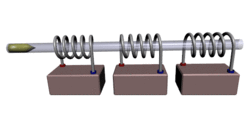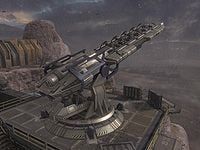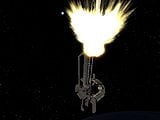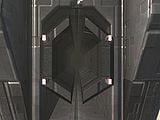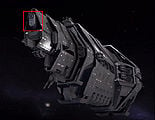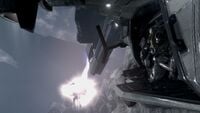Magnetic Accelerator Cannon
From Halopedia, the Halo wiki
The Magnetic Accelerator Cannon (MAC), also known as the Mass Accelerator Cannon,[1][2] is a weapon system employed by the United Nations Space Command on its warships and orbital defense platforms. Essentially large coilguns, MACs serve as the primary armament of UNSC Navy warships and orbital defense platforms.
Overview
Operational design
The theory behind the operation of a Magnetic Accelerator Cannon is the same as that of a coilgun. The system is a linear motor consisting of a series of magnetic coils which accelerate a metal projectile through a barrel up to high velocity. This technology is not to be confused with that of a railgun, in which a projectile is electromagnetically accelerated between two conducting rails.
Firing operation
The firing process uses electromagnetism to fire a metal slug at high velocity. An extremely large amount of current is put through the first solenoid, (coil of conducting wire), which creates a strong magnetic field that attracts the slug. As the slug passes into the solenoid, the solenoid is quickly turned off and the second solenoid, which is closer to the muzzle, turns on, which attracts the now higher-velocity metal slug just like the first solenoid, and the process is carried on.
A shipboard MAC draws power from the ship's reactor and requires a charge of the weapon's magnetic coils in order to be fired. The time it takes to bring the MAC's systems to full charge on a UNSC vessel is the deciding factor during in-combat use. Thus, while a vessel may not run out of ammunition for a long time, (depending on the size/weight of the slugs and the capacity of the ship), a commanding officer has to carefully analyze the situation of a battle and use his shots strategically. The weapon could be fired even when not at full charge, but the velocity of the projectile will be greatly diminished.
Orbital defense platforms have the same firing process, though they launch much more massive projectiles, (3,000 tons), with greater frequency. At the moment a slug leaves an ODP-mounted MAC's muzzle, a pair of thrusters on the bottom side of the station fire for a few of seconds to counteract the acceleration imparted to the station.[3]
Ammunition
Payloads used in the Magnetic Accelerator Cannon weapon delivery system alternates with the platform which the weapon is hosted; warship models tend to use ferric, ferrous, or depleted uranium cores whereas orbital platform models commonly use ferric tungsten rounds.[4]
The standard frigate-based MAC fires a 600-ton slug around 3,000 kilometers per second. The high muzzle velocity provides the slug the kinetic energy and momentum necessary to damage a target and partially mitigates its unguided nature and its lack of maneuverability.[5] A "Super MAC" mounted on an orbital defense platform fires a 3,000-ton slug at nearly .04c, or around 12,000 kilometers per second, which is capable of piercing multiple obstacles before fully stopping the projectile if needed.[4]
Aiming
The size of a Magnetic Accelerator Cannon is such that it is normally an integral component of a warship's structure. Orbital defense platforms are built around the massive weapon. A dedicated targeting computer or an AI is typically required to aim or fire the cannon, as the projectiles are unguided.[citation needed]
Types
There are numerous variations of the MAC technology, influenced primarily by the platforms on which they are installed. All known frigate classes carry one MAC system, whereas the standard destroyer[6] and the Marathon-class heavy cruiser carry two MACs.[7] The Navy's post-war flagship, UNSC Infinity, is armed with four Magnetic Accelerator Cannons.[8]
Frigate

A standard frigate-mounted MAC averages at 183 metres (600 ft).[2] It can fire a 600-ton ferric-tungsten projectile with a depleted uranium core at 3,000 kilometers per second.[5] The large amount of energy needed to fire the weapon is particularly onerous on a warship, and the extended recharge time is a significant factor in combat against Covenant warships as multiple MAC rounds are required to penetrate Covenant shields. At approximately 64 kilotons per shot, the standard Magnetic Accelerator Cannon is sufficient to destroy any human vessel or severely damage an unshielded Covenant vessel.[note 1]
The Charon-class light frigate is equipped with the Mark II, Light Coil – 83B6R3/MAC.[8]
Specialized and modified versions
The standard MAC can be enhanced with booster capacitors which allow the weapon to be fired three times per charge rather than once per charge. This improved technology was only known to be implemented with the UNSC Pillar of Autumn prior to the Fall of Reach.[9] The modified weapon charged faster than the standard version, though this is likely due to the Pillar of Autumn's advanced reactors.[9] Also exclusive to the Pillar of Autumn along with the modified MAC were newer and lighter MAC rounds that had less dense ferrous core, but a harder outer layer of tungsten carbide.[9]
The first in her own class, UNSC Infinity is equipped with four CR-08, Series-8 Magnetic Accelerator Cannons.[8]
"Super" Magnetic Accelerator Cannon
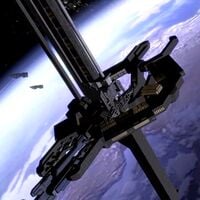
- Main article: Orbital defense platform
A UNSC orbital platform typically mounts larger and more powerful version of the standard Magnetic Accelerator Cannon, nicknamed the "Super" MAC or the "big stick". At 802.2 metres (2,632 ft) long,[2] these cannons fire a 3,000-ton ferric-tungsten rounds at .04c or 4% of the speed of light, impacting with a massive amount of relativistic kinetic energy, which is of equivalent to 51.6 gigatons of TNT.[4][note 2] No known ship, UNSC or Covenant, has been shown to survive the impact of one of these rounds, with shielded Covenant destroyers being shattered to "a million fragments" upon impact.[10] Against Covenant shield technology, the rounds possess enough kinetic energy to punch through shields, cut through the ship and, upon exit, still retain enough energy to cripple or destroy a second ship.
By receiving power from ground-based power plants, orbital defense platforms could achieve recharge and reload times as short as five seconds.[4][3]
Mini-MAC
A UNSC "Mammoth" terrestrial siegework platform mounts a miniature, mobile version of the standard Magnetic Accelerator Cannon, referred to as a "Mini-MAC".[11] It is designed to destroy terrestrial and suborbital fortifications and warships.[12]
Mark 2488 "Onager"
- Main article: Mark 2488 Magnetic Accelerator Cannon
The Mark 2488 Magnetic Accelerator Cannon, informally known as the Onager, is a relatively small Magnetic Accelerator Cannon used for static defense. Both manned[13] and unmanned[14] versions have seen use in combat.
Related technologies
M68 Gauss Cannon
- Main article: M68 Gauss Cannon
The M68 Gauss Cannon is a weapon mounted on the M12G1 Light Anti-Armor Vehicle as well as on stationary turrets. It utilizes the same coilgun technology used in MAC, but on a smaller scale.
M92 Principle Gauss Cannon
- Main article: M92 Principle Gauss Cannon
The M92 Principle Gauss Cannon is a weapon system of similar MAC mechanics that runs along the length of the Open Frame 92/Extra-Vehicular Activity.
M99 Stanchion Gauss Rifle
- Main article: Model 99 Special Application Scoped Rifle
The M99 is a man portable anti-matérial and anti-personnel special application weapon using 5.4mm/.21 caliber rounds. Like the M68 Gauss Cannon, it utilizes the same coilgun technology as a MAC, only on an even smaller scale. Though smaller than conventional ammunition, these rounds are accelerated to speeds fast enough to travel long distances with almost no change in trajectory, punch through any obstructing materials, hit their target, and still retain significant kinetic energy.
Mass drivers
- Main article: Mass driver
The mass driver is an orbital launch assembly designed to propel low-weight payloads into orbit, otherwise known as orbital lifting, or to deliver them across a planetary system. The operating principle of the mass driver is essentially the same as that of the Magnetic Accelerator Cannon: it is a large coilgun that magnetically accelerates a package consisting of a magnetizable holder containing a payload.
While not a purpose-built weapon like the Magnetic Accelerator Cannon, these platforms are still potent weapons of opportunity. While never formally incorporated as a weapon, mass drivers have been used at as defensive magnetic accelerator weapons at Harvest, the Rubble, and Reach.
Halo Wars gameplay
MAC Blast
- "Use the Spirit of Fire's awesome Mass Accelerator Cannon to incinerate enemy troops."
- — In-game description.
In Halo Wars, the MAC Blast ability allows the player to use the UNSC Spirit of Fire's point-defense MACs for pinpoint orbital bombardment. It is mainly used as a support weapon to help the UNSC penetrate heavy Covenant defenses and Covenant bases, and is a potent weapon against Scarabs.
In skirmish and multiplayer, the MAC Blast can only be used if Captain James Cutter is selected as the player's leader character. In the campaign, the MAC Blast is available in several missions, most notably Dome of Light, during which the player is granted access to forty rapid-fire MAC rounds to destroy a Covenant base.
Gallery
Nassau Station firing its MAC.
An orbital defense platform above Reach firing its main cannon.
- Navesota.jpg
A frontal view of a Charon-class light frigate's MAC.
Three UNSC frigates unleashing their MACs on the Forerunner Dreadnought over the Voi portal artifact.
- Halo3 - FrigateAssault.png
MAC slugs impacting the Dreadnought, to little effect.
- MAC - Bombardment.jpg
A MAC round impacting the surface of Harvest.
The UNSC Grafton firing its MAC at Spire One.
The UNSC Infinity fires her twin MAC cannons at the Didact's flagship, Mantle's Approach.
- HaloWars-MACBlast-Reticule.jpg
The aiming reticle of the MAC gun in Halo Wars.
List of appearances
- Halo: The Fall of Reach (First appearance)
- Halo: Combat Evolved
- Halo: The Flood
- Halo: First Strike
- Halo 2
- Halo: Ghosts of Onyx
- Halo 3
- Halo: Contact Harvest
- Halo: The Cole Protocol
- Halo: Evolutions - Essential Tales of the Halo Universe
- Halo Legends
- Halo: Reach
- Halo: The Thursday War
- Halo 4
Notes
- ^ The Halo Encyclopedia lists the MAC's yield around 1.17 teratons, fired at .4c or 40% speed of light. This figure is woefully exaggerated, as the explosive yield would be 27 times greater than that of the Trinity atomic bomb test.
- ^ The Halo Encyclopedia lists the Super MAC's yield around 9.98 teratons, fired at .5c or 50% the speed of light. The explosive yield caused by this impact, (velocity aside), would be nearly 1/100th as powerful as the Chicxulub impactor, which is widely theorized to have killed the dinosaurs. This would almost 20,000 times more powerful than the Tsar Bomba, the largest nuclear device ever detonated, which had a yield of 57 megatons.
Sources
- ^ Halo: Contact Harvest, page 119
- ^ a b c Halo: The Essential Visual Guide, page 114
- ^ a b Halo 2, campaign level Cairo Station
- ^ a b c d Halo: The Fall of Reach, page 283
- ^ a b Halo: The Fall of Reach, page 108; (2010 edition), page 130
- ^ Halo: The Fall of Reach, page 139
- ^ Halo Encyclopedia, page 251
- ^ a b c Waypoint: The Halo Bulletin: 10.10.12
- ^ a b c Halo: The Fall of Reach, page 275
- ^ Halo: The Fall of Reach, page 297 (2001 edition)
- ^ Halo 4, campaign level Reclaimer
- ^ Halo 4 Interactive Guide
- ^ Halo: Reach, campaign level The Pillar of Autumn
- ^ Halo 4, campaign level Composer
